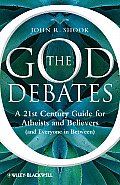Monday, November 28, 2011
Book Review: Surprised by Oxford
Sunday, November 27, 2011
Book Review: The God Debates
John Shook's The God Debates: A 21st Century Guide for Atheists and Believers (and everyone in between) is a stunning addition to the sometimes highly volatile contemporary arguments over God that are so prominent. The author takes a serious in-depth look at just about every argument used by apologists of religion (particularly Christian) and teases them apart, describing how they are constructed, and uncovering the many flaws that make them ineffective.
Shook categorizes arguments for God in the following way:
- Theology from the scripture - arguments for God based on special revelation and apologetics
- Theology from the world - arguments for God derived from the natural world, morality, human experience, and human analogy
- Theology beyond the world - cosmological arguments, teleological arguments, and arguments from the laws of nature
- Theology in the know - Reformed epistemology, foundationalism
- Theology into the myst - arguments based in mysticism, relativism, existentialism, and scriptural interpretation
Saturday, November 05, 2011
Book Review: God Without Religion
Andrew Farley has followed up his previous book, The Naked Gospel, with another brilliant turn in God Without Religion. Farley has the gift of making profound things simple - and nothing is more in need of simplifying than religious teaching about the gospel that persists in keeping Christians in bondage.
The central point of God Without Religion is that Christians now live under the New Covenant which has jettisoned the Mosaic Law and replaced it with a new ethical foundation in the gospel of grace soaked in the power of the Holy Spirit. For Farley, many Christians have not grasped the freedom they have in Christ. They are bound up (the original meaning of the term from which religion is derived) in the oppressive belief that the have to keep the at least some of the Old Testament laws.
Of course, many will object to this message of grace plus nothing and frequently appeal to NT passages about behavior, law, and obedience. But one of Farley's gifts is to exegete Scripture and he looks at these common passages, teasing out there actual meaning in their literary and historical contexts. His explanations are clear, simple, and penetrating and I often sat breathless as I wondered why I hadn't seen these things before.
If you are living a religion that insists on defining rules or laws for you that you must live by then you must read this book. St Paul, in Galatians 5, provocatively drives home the fact that the whole point of Christ's ministry was to bring freedom. And the only way to live as a Christian is to live by the Spirit - not by being lashed to the Mosaic Law. As Farley points out, the law can only provoke us to sin. It was never intended as a tool for Christians to live their lives by. The fruits of the Spirit (love, joy, peace, and so on) are produced in us quite separate from law.
God Without Religion is a stunning second book from Farley. He uses analogies and stories to good effect; he makes the Bible come alive; and he makes controversial issues, that have plagued the church, practical and relevant. Get this book without delay and come to know God without religion.
Book details: Farley, Andrew (2011). God Without Religion. Baker Books.



